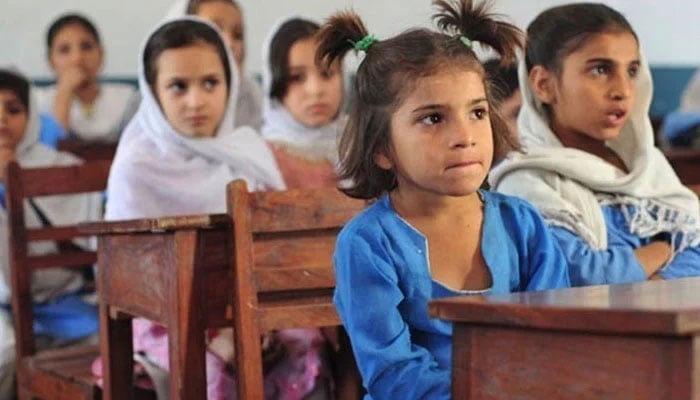Education crisis
Country has a two-fold education crisis: 26 million children are out of school, and 43 million children in school are not learning as much as they should
Pakistan’s education emergency refuses to go away. it is not that difficult to understand why: the country’s ruling elite have hardly ever paid much attention to education or healthcare for the people. According to a report published by the think tank Tabadlab, the country has a two-fold education crisis: 26 million children are out of school, and 43 million children in school are not learning as much as they should. The report further says, “Only 23 per cent of students at late primary age (10) in Pakistan can read and understand an age-appropriate text.” In the 2019 TIMSS assessment, according to the report, Pakistan was the second-lowest-ranked country. Quality education in the country has become a privilege. Children from wealthy backgrounds have the resources to get an education at high-ranking, well-equipped institutions. They then qualify for scholarships offered by foreign universities, climbing up the ladder of success. But for a majority of people in Pakistan, quality education is a distant dream – that too in a country where private schools keep cropping up regularly.
Over the years, the government has almost stopped spending on education. The education budget keeps decreasing, and most officials openly express their aversion to public schools, arguing that education should be handed over to the private sector. The government’s lack of willingness to invest in education has resulted in the mushroom growth of private schools where almost anyone with capital can set up a school or college. Residential neighbourhoods now have low-tier private schools on every corner. But the level of education at these schools is embarrassingly bad. And since most of them offer salaries that are below the minimum wage, highly qualified and trained teachers do not apply there. Untrained and overworked teachers are left to conduct sessions. Unlike public schools that require teachers to complete their training, many private schools do not have strict criteria for appointing teachers. The Tabadlab report also underscores an interesting point. Even though the performance of the education system is unsatisfactory, Pakistani parents are ‘very satisfied’ with what their children learn. This may well be because of the marks their children get for class tests and other examinations. Pakistan’s education system heavily relies on rote learning, and students who are good at memorization easily obtain good marks on their tests. However, most fail to recall the concepts learned in the previous grade. Both parents and schools pay no attention to critical thinking skills.
Resultantly, we see students who show no interest in coming up with indigenous solutions to Pakistan-specific problems, and they are largely interested in memorizing long essays to get good marks. Pakistani authorities need to introduce well-thought-out reforms in the education sector. The first step should be to ensure that students at the primary level are taught in their mother tongue so that they can easily understand the crucial science and mathematics concepts. Schools here mostly focus on one language, not realizing that it is difficult for students to learn new concepts in a foreign language. And while students rote-learn the detailed answers, they fail to retain the information after their session ends. A nation cannot progress without education. The government has to work together with educationists to draft a strategy to fix the country’s dismal education sector. Experts have done impressive work in highlighting the flaws in our education system. It is time the authorities concerned paid attention to this neglected sector.
-
 King Charles Holds Emergency Meeting After Andrew Arrest: 'Abdication Is Not Happening'
King Charles Holds Emergency Meeting After Andrew Arrest: 'Abdication Is Not Happening' -
 Amazon Can Be Sued Over Sodium Nitrite Suicide Cases, US Court Rules
Amazon Can Be Sued Over Sodium Nitrite Suicide Cases, US Court Rules -
 'Vikings' Star Mourns Eric Dane's Death
'Vikings' Star Mourns Eric Dane's Death -
 Patrick Dempsey Reveals Eric Dane's Condition In Final Days Before Death
Patrick Dempsey Reveals Eric Dane's Condition In Final Days Before Death -
 'Heartbroken' Nina Dobrev Mourns Death Of Eric Dane: 'He'll Be Deeply Missed'
'Heartbroken' Nina Dobrev Mourns Death Of Eric Dane: 'He'll Be Deeply Missed' -
 Andrew Mountbatten-Windsor’s Arrest: What Happened When A Royal Was Last Tried?
Andrew Mountbatten-Windsor’s Arrest: What Happened When A Royal Was Last Tried? -
 Alyssa Milano Expresses Grief Over Death Of 'Charmed' Co-star Eric Dane
Alyssa Milano Expresses Grief Over Death Of 'Charmed' Co-star Eric Dane -
 Prince William, Kate Middleton Camp Reacts To Meghan's Friend Remarks On Harry 'secret Olive Branch'
Prince William, Kate Middleton Camp Reacts To Meghan's Friend Remarks On Harry 'secret Olive Branch' -
 Daniel Radcliffe Opens Up About 'The Wizard Of Oz' Offer
Daniel Radcliffe Opens Up About 'The Wizard Of Oz' Offer -
 Channing Tatum Reacts To UK's Action Against Andrew Mountbatten-Windsor
Channing Tatum Reacts To UK's Action Against Andrew Mountbatten-Windsor -
 Brooke Candy Announces Divorce From Kyle England After Seven Years Of Marriage
Brooke Candy Announces Divorce From Kyle England After Seven Years Of Marriage -
 Piers Morgan Makes Meaningful Plea To King Charles After Andrew Arrest
Piers Morgan Makes Meaningful Plea To King Charles After Andrew Arrest -
 Sir Elton John Details Struggle With Loss Of Vision: 'I Can't See'
Sir Elton John Details Struggle With Loss Of Vision: 'I Can't See' -
 Epstein Estate To Pay $35M To Victims In Major Class Action Settlement
Epstein Estate To Pay $35M To Victims In Major Class Action Settlement -
 Virginia Giuffre’s Brother Speaks Directly To King Charles In An Emotional Message About Andrew
Virginia Giuffre’s Brother Speaks Directly To King Charles In An Emotional Message About Andrew -
 Reddit Tests AI-powered Shopping Results In Search
Reddit Tests AI-powered Shopping Results In Search




